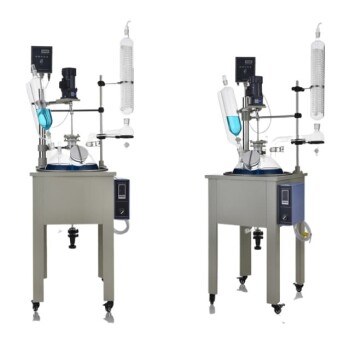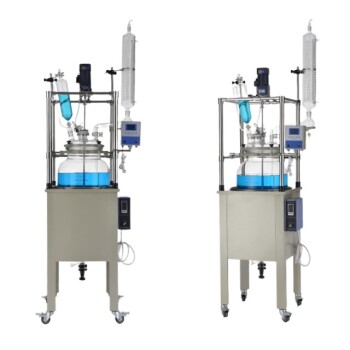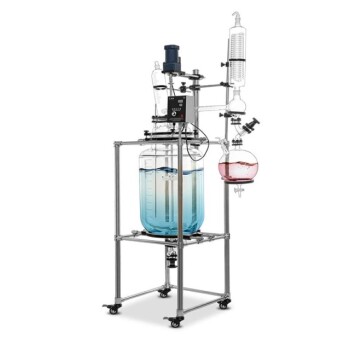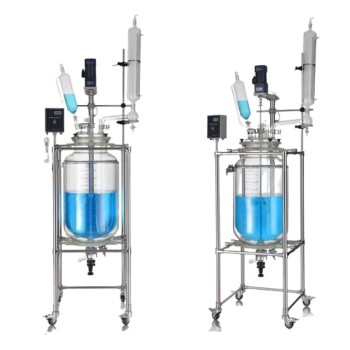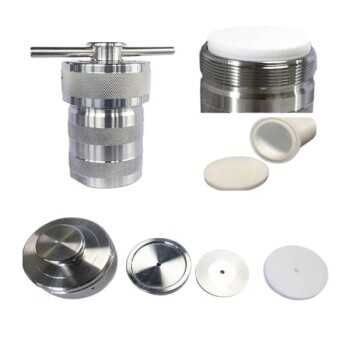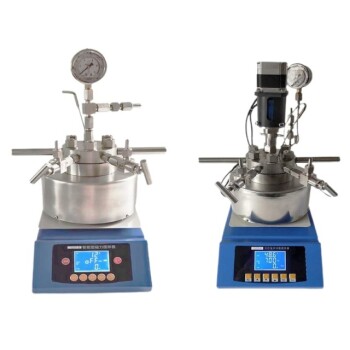Glass reactors are versatile pieces of equipment widely used in industries such as chemical, pharmaceutical, and biotechnology, as well as in research and educational settings. They are designed to handle a variety of chemical processes, including synthesis, polymerization, distillation, crystallization, and extraction. Glass reactors can operate under a wide range of temperatures (from -80℃ to 300℃) and pressures, including vacuum conditions, making them suitable for diverse experimental and industrial applications. Their transparency allows for easy monitoring of reactions, and their chemical resistance ensures compatibility with a broad spectrum of substances. This makes them indispensable for processes like solvent synthesis, purification, concentration, and stirring reactions.
Key Points Explained:

-
Applications in Key Industries:
- Chemical Industry: Glass reactors are used for chemical synthesis, polymerization, and distillation. They are essential for producing resins, plastics, and other chemical compounds.
- Pharmaceutical Industry: These reactors play a critical role in drug development, including the crystallization of active pharmaceutical ingredients (APIs) and the extraction of natural products.
- Biotechnology: Glass reactors are used for bioprocessing, such as fermentation and the production of biologics.
-
Versatility in Chemical Processes:
- Synthesis: Glass reactors facilitate the creation of new compounds through controlled chemical reactions.
- Polymerization: They are used to produce polymers, resins, and plastics by combining monomers under specific conditions.
- Distillation: Glass reactors enable the separation of solvents and other volatile compounds through heating and condensation.
- Crystallization: They are used to purify chemical compounds by forming solid crystals from a solution.
- Extraction: Glass reactors are employed to isolate desired compounds from plant materials or natural products.
-
Temperature and Pressure Adaptability:
- High-Temperature Reactions: Glass reactors can withstand temperatures up to 300℃, making them suitable for processes like solvent synthesis and distillation.
- Low-Temperature Reactions: They can operate at temperatures as low as -80℃, which is essential for certain chemical reactions and material preservation.
- Vacuum Reactions: Glass reactors can create a vacuum environment, enabling negative pressure reactions such as vacuum distillation and purification.
-
Types of Reactions Supported:
- Distillation and Reflux: These processes are used for separating and purifying liquids.
- Vacuum Distillation: This technique is used to distill compounds that are sensitive to high temperatures.
- Extraction Separation: Glass reactors are used to separate desired compounds from mixtures.
- Purification and Concentration: These processes are critical for producing high-purity chemicals and pharmaceuticals.
- Stirring Reactions: Glass reactors often include stirring mechanisms to ensure uniform mixing and reaction conditions.
-
Design and Functionality:
- Batch vs. Continuous Reactors: Glass reactors can function as batch reactors (processing a fixed quantity of material at a time) or continuous reactors (processing materials continuously).
- Transparency and Monitoring: The transparent nature of glass allows for easy observation of reactions, which is crucial for quality control and process optimization.
- Chemical Resistance: Glass reactors are resistant to a wide range of chemicals, making them suitable for diverse applications.
-
Use in Research and Education:
- Glass reactors are widely used in scientific research and educational laboratories for experiments and process development. Their adaptability and ease of use make them ideal for teaching and training purposes.
-
Economic and Operational Benefits:
- Glass reactors are designed to increase the net value of chemical processes by producing high-quality catalysts, reagents, or inert compounds. Their efficiency and versatility contribute to cost savings and improved productivity in industrial settings.
In summary, glass reactors are indispensable tools in chemical, pharmaceutical, and biotechnology industries, as well as in research and education. Their ability to handle a wide range of temperatures, pressures, and chemical processes makes them highly versatile and valuable for both industrial and experimental applications.
Summary Table:
| Key Feature | Description |
|---|---|
| Applications | Chemical synthesis, polymerization, distillation, crystallization, extraction |
| Industries | Chemical, pharmaceutical, biotechnology, research, education |
| Temperature Range | -80℃ to 300℃ |
| Pressure Capabilities | Operates under vacuum conditions |
| Design Benefits | Transparency for monitoring, chemical resistance, batch/continuous operation |
| Economic Benefits | Cost savings, improved productivity, high-quality output |
Ready to enhance your lab or industrial processes with a glass reactor? Contact us today to learn more!


